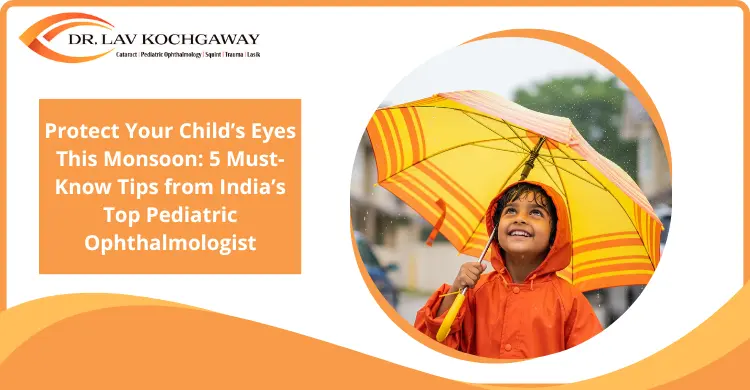
The monsoon turns streets into playgrounds, fills the air with the scent of fresh rain, and gives children countless reasons to splash around. But hidden behind the joy is a seasonal surge in monsoon eye infections, a risk parents can’t ignore.
High humidity, stagnant water, and rapid germ spread make this time of year particularly dangerous for young eyes. Schools, playgrounds, and public spaces become hotspots for bacteria and viruses that can cause irritation, allergies, or even serious vision problems.
Explore these five essential child eye care tips to help parents protect their little ones through the rainy months.
Children’s eyes are delicate, and their habits often put them at risk. The most common monsoon-related eye issues include:
Kids are more vulnerable because they touch their faces frequently, share towels and stationery, and may not wash their hands properly. Left untreated, even a mild infection can lead to lasting damage.
Cleanliness is your child’s first shield against a monsoon eye infection. Encourage them to:
This simple habit can dramatically reduce infection spread both at home and in school.
Rainwater might seem harmless, but it can carry pollutants, dust, and harmful microbes. Teach your child to:
Even a few drops of contaminated rainwater can cause irritation, so prevention is far better than cure.
Prompt action prevents minor issues from becoming serious. Be alert for:
If these symptoms appear, visit an eye specialist right away. Avoid self-medicating with over-the-counter eye drops, they can worsen the condition or hide symptoms.
A strong immune system can help your child fight seasonal infections. Include in their diet:
Cutting down on fried and processed snacks during monsoon can also lower inflammation and improve recovery.
Protective eyewear is not just for sports. It can:
A lightweight pair of glasses or goggles can make a world of difference in keeping eyes safe.
Seek urgent medical care if your child experiences:
Prompt treatment can prevent complications and protect long-term vision. Pediatric ophthalmologists specialize in child-friendly care, making eye exams less stressful and more effective.
As the clouds gather and the rain paints the world fresh and green, let’s make sure your child’s eyes stay just as bright. A few mindful habits like clean hands, dry eyes, healthy meals, and timely check-ups can shield them from common monsoon eye infections. This season, let the only thing your child catches be raindrops, not germs. After all, protecting young vision today means giving them a clearer, more colourful world tomorrow.
The monsoon may bring joy, but it also increases the risk of eye infections in children. Trust Dr. Lav Kochgaway for early detection, expert care, and prevention strategies tailored for young eyes. Don’t wait for symptoms to appear, early check-ups can make all the difference.
Schedule your child’s eye examination now and take the first step toward ensuring clear, healthy vision through the rainy season and beyond.
Children frequently touch their eyes, share personal items, and have developing immunity, making them more susceptible to infections in the humid, germ-prone monsoon season.
The most common include conjunctivitis (pink eye), styes, allergic reactions, and corneal infections, all of which require prompt care.
Maintaining strict hygiene, keeping eyes dry, avoiding eye rubbing, using protective eyewear, and ensuring a nutritious diet rich in vitamins help prevent infections.
If your child has persistent redness, swelling, pain, blurred vision, or light sensitivity, it’s important to seek expert care immediately.
Home remedies can sometimes worsen eye conditions if not used properly. It’s best to consult an eye specialist before trying any treatment at home.